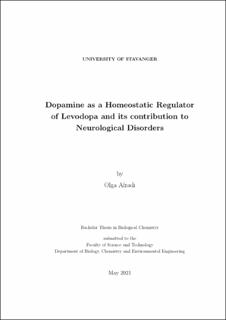| dc.description.abstract | Homeostasis is the tendency to maintain a relatively constant internal environment. The concept of homeostasis is essential when it comes to understanding organisms and their ability to adapt when faced with external changes. Integral control can be implemented by three conditions. These are zero-order, first-order and second-order kinetics. Time-dependent perturbations are rapidly increased to study whether the controlled variable can be kept at a set-point. The ideal behavior of a controller would be that step-wise perturbations drive the controller back to its theoretical set-point. The results presents how integral control and negative feedback are key features when determining the performance of a controller. In this thesis we study the performance of negative feedback controllers. Dopamine (DA) plays a significant role in homeostatically regulating Levodopa (L-DOPA/DOPA) through these negative feedback mechanisms. The importance of this regulation is highlighted in the thesis because small dysregulations of DOPA has seemingly proven to be the source of several neurological disorders. The controllers are able to deal with different time-dependent perturbations. However, when facing concentration values in either a too high or too low degree, the controller has a disadvantage of breaking down. The implementation of compensatory values were included to test whether the reaction could return to set-point. | |
